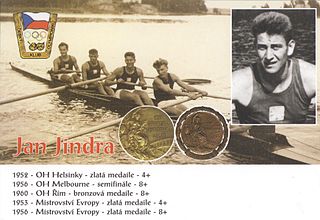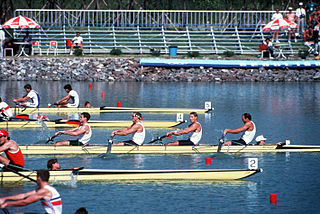
The men's single sculls competition at the 2004 Summer Olympics took place at Schinias Olympic Rowing and Canoeing Centre, Greece. The event was held from 14 to 21 August and was one of six events for male competitors in Rowing at the 2004 Summer Olympics in Athens. There were 29 competitors from 29 nations, with each nation limited to a single boat in the event. The event was won by Olaf Tufte of Norway. Silver went to Jüri Jaanson of Estonia, with bronze to Ivo Yanakiev of Bulgaria. It was the first medal in the men's single sculls for all three nations. Marcel Hacker's failure to make the final made this the first men's single sculls race since 1956 without a German rower on the podium; between the United Team of Germany, East Germany, West Germany, and Germany, the German medal streak in the event had been 11 Games long.

The men's eight competition was one of six events for male competitors in Rowing at the 2004 Summer Olympics in Athens. It was held from 15 to 22 August. There were 9 boats from 9 nations, with each nation limited to a single boat in the event. The event was won by the United States, the nation's first victory in the men's eight since 1964 and 12th overall. The Netherlands took silver. Australia, the reigning silver medalist, finished with bronze this time.

The men's coxed pair event was a rowing event conducted as part of the 1964 Summer Olympics programme. It was held from 11 to 15 October. There were 16 boats from 16 nations, with each nation limited to a single boat in the event. The event was won by American crew Edward Ferry, Conn Findlay, and coxswain Kent Mitchell. Findlay had been on the United States gold medal crew in 1956 and bronze medal crew in 1960; he was the first man to earn two gold medals in the event, as well as the first man to win three medals of any color in the event. Mitchell had also been on the 1960 crew, and was the seventh man to earn multiple medals in the coxed pair. Jacques Morel, Georges Morel, and cox Jean-Claude Darouy took silver to earn France's first medal in the event since 1952. Herman Rouwé, Erik Hartsuiker, Jan Just Bos earned what was formally the Netherlands' first medal in the event; a pair of Dutch rowers had won the first edition in 1900, but had jettisoned their cox in favor of a local French boy between rounds and thus that medal was a "mixed team" medal.

The men's eight event was a rowing event conducted as part of the 1964 Summer Olympics programme. It was held from 12 to 15 October at the Toda Rowing Course. There were 14 boats from 14 nations, with each nation limited to a single boat in the event. The event was won by the United States, returning the top of the podium after losing their eight-Games winning streak with a fifth-place finish in 1960; it was the nation's 11th overall victory in the men's eight. The defending champions, the United Team of Germany, took silver; the Germans defeated the United States in the opening round but lost the rematch in the final after the Americans advanced through the repechage. Czechoslovakia repeated as bronze medalists.

The men's coxed pair competition at the 1972 Summer Olympics in Munich took place from 27 August to 2 September at the Olympic Regatta Course in Oberschleißheim. There were 21 boats from 21 nations, with each nation limited to a single boat in the event. The event was won by East German crew Wolfgang Gunkel, Jörg Lucke, and coxswain Klaus-Dieter Neubert; it was the first medal in the event for East Germany as a separate nation. Czechoslovakia (silver) and Romania (bronze) also won their first medals in the men's coxed pair.

The men's coxed four competition at the 1932 Summer Olympics in Los Angeles took place at the Long Beach Marine Stadium. It was held from 10 to 13 August. There were 7 boats from 7 nations, with each nation limited to a single boat in the event. The event was won by Germany, the nation's first victory in the event since 1912 and third overall. Defending champions Italy came within 0.2 seconds of repeating, with Germany passing them at the very end of the final. Poland won its second consecutive bronze medal.

The men's coxed four competition at the 1952 Summer Olympics took place at Mei Bay, Helsinki, Finland. It was held from 20 to 23 August and was won by the team from Czechoslovakia. There were 17 boats from 17 nations, with each nation limited to a single boat in the event. The gold medal was Czechoslovakia's first medal in the men's coxed four. Switzerland earned its third consecutive silver medal, and sixth medal in seven Games dating back to 1920. The reigning champion United States took bronze.
The men's quadruple sculls competition at the 1984 Summer Olympics took place at took place at Lake Casitas, California, United States of America.

The men's coxed four competition at the 1988 Summer Olympics took place at Misari Regatta, South Korea. It was held from 19 to 24 September. There were 14 boats from 14 nations, with each nation limited to a single boat in the event. The event was won by East Germany, returning to the top of the podium after the Soviet-led boycott in 1984 prevented the East Germans from defending their 1980 Olympic title. Silver went to Romania, its first medal in the men's coxed four. New Zealand took a second consecutive bronze medal in the event.
The men's double sculls competition at the 1984 Summer Olympics took place at took place at Lake Casitas, California, United States of America.

The men's coxed pair competition at the 1984 Summer Olympics took place at Lake Casitas, California, United States. It was held from 31 July to 5 August. There were 12 boats from 12 nations, with each nation limited to a single boat in the event. The event was won by the Italian crew, brothers Carmine Abbagnale and Giuseppe Abbagnale and coxswain Giuseppe Di Capua. It was Italy's first victory in the event since 1968 and third overall, tying the United States and East Germany for most among nations to that point. The Abbagnale brothers and Di Capua would go on to repeat as champions in 1988 and take silver in 1992. The Romanian crew of Dimitrie Popescu, Vasile Tomoiagă, and cox Dumitru Răducanu took silver. Americans Kevin Still, Robert Espeseth, and cox Doug Herland took bronze. The three-Games gold-medal streak for East Germany ended with that nation joining the Soviet-led boycott.
The women's quadruple sculls competition at the 1984 Summer Olympics took place at Lake Casitas, California, United States.
The women's coxless pair competition at the 1984 Summer Olympics took place at took place at Lake Casitas, California, United States of America.
The women's double sculls competition at the 1984 Summer Olympics took place at took place at Lake Casitas, California, United States of America. The event was won by Romanians Marioara Popescu and Elisabeta Lipă ; it was the first of Lipă's 5 Olympic gold medals.
The men's double sculls competition at the 1988 Summer Olympics took place at took place at Han River Regatta Course, South Korea.

The men's eight competition at the 1956 Summer Olympics took place at Lake Wendouree near Ballarat, Australia. It was held from 23 to 27 November. There were 10 boats from 10 nations, with each nation limited to a single boat in the event. The event was won by the United States, the nation's eighth consecutive and 10th overall gold medal in the men's eight; the Americans had won every time they competed. Canada took silver, its first medal in the men's eight since 1932. Australia repeated as bronze medalists.
The men's quadruple sculls competition at the 1988 Summer Olympics took place on the Han River Regatta Course, South Korea.
The men's coxless pair competition at the 1988 Summer Olympics took place at took place at Han River Regatta Course, South Korea.

The men's coxed pair competition at the 1988 Summer Olympics took place at Misari Regatta, South Korea. It was held from 20 to 25 September. There were 14 boats from 14 nations, with each nation limited to a single boat in the event. The event was won by Italian crew Carmine Abbagnale, Giuseppe Abbagnale, and coxswain Giuseppe Di Capua; they were the second crew to repeat as Olympic gold medalists. It was Italy's fourth victory in the event, most all-time among nations over the United States and East Germany at three. The East Germans, after winning their three gold medals consecutively from 1972 to 1980 before missing the 1984 Games due to the Soviet-led boycott, returned with a silver medal performance in Seoul by Mario Streit, Detlef Kirchhoff, and cox René Rensch. Great Britain took its first-ever medal in the event with a bronze by Andy Holmes, Steve Redgrave, and cox Patrick Sweeney.
The men's eight competition at the 1992 Summer Olympics took place at Lake of Banyoles, Spain. It was held from 28 July to 2 August. There were 14 boats from 14 nations, with each nation limited to a single boat in the event. The event was won by Canada, the nation's second victory to match Great Britain, East Germany, and West Germany for second-most among nations. Romania earned its first medal in the men's eight with silver. A reunited Germany took bronze; West Germany had been the defending champion.









